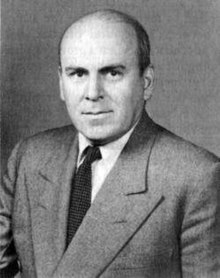John J. McCloy
| John McCloy | |
|---|---|
 |
|
| 2nd President of the World Bank Group | |
|
In office March 17, 1947 – July 1, 1949 |
|
| President | Harry Truman |
| Preceded by | Eugene Meyer |
| Succeeded by | Gene Black |
| American High Commissioner for Occupied Germany | |
|
In office September 21, 1949 – August 1, 1952 |
|
| Preceded by | Position established |
| Succeeded by | James Conant |
| Personal details | |
| Born |
John Jay McCloy March 31, 1895 Philadelphia, Pennsylvania, U.S. |
| Died | March 11, 1989 (aged 93) Stamford, Connecticut, U.S. |
| Political party | Republican |
| Spouse(s) | Ellen Zinsser (1930–1986) |
| Children | 2 |
| Education |
Amherst College (BA) Harvard University (JD) |
John Jay McCloy (March 31, 1895 – March 11, 1989), was an American lawyer and banker who served as Assistant Secretary of War during World War II. After the war he served as president of the World Bank, U.S. High Commissioner for Germany, chairman of Chase Manhattan Bank, and chairman of the Council on Foreign Relations. He later became a prominent United States presidential adviser, served on the Warren Commission, and was a member of the foreign policy establishment group of elders called "The Wise Men."
McCloy was the son of John J. McCloy (1862-1901) and Anna (née Snader) McCloy (1866-1959). His father was a successful insurance man who died when the son was five. His mother was a hairdresser in Philadelphia, with many high-society clients. His original name was "John Snader McCloy." It was later changed to "John Jay McCloy", probably to sound more aristocratic.
McCloy was educated at the Peddie School in New Jersey, and Amherst College from which he graduated in 1916. He was an average student who excelled at tennis and moved smoothly among the sons of the nation's elite. McCloy was a brother of Beta Theta Pi Fraternity at Amherst where he was initiated as Roll No. 330.
McCloy enrolled in Harvard Law School in 1916, and he was an average student. He was profoundly influenced by his experience at the Plattsburg Preparedness camps. When the US entered the war in 1917, he joined the Army in May and was trained at Plattsburg, New York and was commissioned as a second lieutenant in the Artillery on August 15, 1917. He was promoted to first lieutenant on December 29. In May 1918 he was assigned as an aide to Brigadier General G. H. Preston - commander of the 160th Field Artillery Brigade of the 85th Division. He sailed for France for service with the American Expeditionary Force in France on July 29, 1918. He saw combat service in the last weeks of the war, as commander of an artillery battery during the Meuse-Argonne Offensive.
...
Wikipedia
